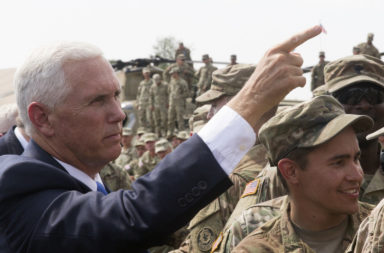For thousands of years, colonies of peoples have made America their home. And on the eve of the American revolution, when the United States were formed, the land was rich with languages and ethnicity; it was a multitude of immigrants from all over the world.
Presidents past and present have understood the importance of immigration for America, with leaders such as Lyndon B. Johnson once stating that “Our beautiful America was built by a nation of strangers”, and Obama more recently saying that immigration “keeps our country cutting edge. And it’s helped build the greatest economic engine the world has ever seen.”
America, according to the 2013 ACS, is home to over 41.3 million first generation immigrants, with second generation immigrants pushing that overall figure up to around 80 million people. This means that a quarter of the US population are either first or second generation immigrants, and the figures continue to increase every year.
There are over 22 million unauthorized immigrants in the US, and these are generally people who want to pay their way but are struggling against a broken system, and an unequal and parochial society. Of all the immigrants in the US, 46% stated they were Latino or Hispanic, followed closely by immigrants from India and China. 11.6 million, the biggest portion, were from Mexico. Of them, 70% were in the civilian labor force.
The majority of immigrants are taxpayers, entrepreneurs, job creators, and consumers. They are Americans. However, for many, the system is fundamentally broken. The route to America, the process of naturalization and authorization, and living and working, all seem to have their own insurmountable obstacles for the millions of immigrants who want to work and contribute. The failure of the immigration system hurts communities and families, and the economy. The families of immigrants enjoy only tentative futures because of their parent’s lack of papers. In addition, in 2014, the State Department had over 4.4 million visa applicants on the waiting list.
Reform, according to The White House, will see America’s GDP increase by over $568 billion by 2022, and add $325 billion in additional income, $75 billion more in taxes, and 820,000 more jobs.
Despite the clear problems of the current system and the clear benefits of reform, the debate has been rumbling on unsuccessfully for years. Congress has eluded decisions, instead pushing them into the executive and judicial branches of government, leaving the lives of millions of undocumented immigrants in the balance, and the economy worse off.
Obama left it until his second term in office to begin moving forward on immigration reform. Despite presiding over the deportation of hundreds of thousands, he is now calling for a more secure border, but more importantly, for protection and a clear and easy path to authorization and naturalization for the millions already in America who want to integrate.
However, the Republicans on the other side of the debate believe that Obama is only granting would-be-migrants one more reason to come to America. According to the Immigration Handbook For The New Republican Majority by Senator Jeff Sessions, American citizens gain nothing but ‘lower wages, higher unemployment, and a heavier tax burden’ from the ‘Obama-backed “immigration reform”.
So, where do the leading presidential candidates stand on this issue?
Donald Trump has really kicked off the immigration debate in the election campaign, stating in his first speech that unauthorized immigrants from Mexico were “beating us, economically”, while at the same time saying that when Mexico sends its people “they’re not sending their best”, they’re “bringing drugs, they’re bringing crime, they’re rapists”. His fiery speech cemented his views on immigration reform, and cemented his open position on a panel that apparently wanted to avoid the topic altogether. On his website, he states his three main policies on this issue: To build a wall on the southern border, to defend the laws of the US, which includes ending birthright citizenship, and mass deportation of those 11 million undocumented immigrants, and to put American workers first.
Forced to talk on the issue, Ben Carson reluctantly stated that he would “seal the borders”, and then he would consider allowing those with “pristine records” to become guest workers. He has also said that he would give immigrants six months to register, so to begin a process of authorization. If people do not complete it within the time frame, they will then be treated as illegals.
Being Latino himself, Marco Rubio is trying to stand up for the rising Latino population in the US. His Cuban heritage, bilingual ability, and the immigration and deportation orders that effected his family, might have seen him as a shining beacon for immigration reform in the Republican Party. In 2013, he attempted to push through reform that would have seen the creation of a pathway to citizenship, but the bill was rejected. However, now in the presidential election, he is caught between his voter base, and the party in which he belongs. He has stated that he wants to first strengthen the border, following then with a less comprehensive effort toward a path to citizenship.
Jeb Bush has said that his plan is more “dignified” than that of his rivals. He condemns the proposals put forward by Donald Trump, and instead has laid out a plan to offer legal status to undocumented workers after meeting a list of criteria. He wants to secure borders first to prevent any future illegal immigration, then to put in a rigorous path to citizenship.
The leading Democratic candidate, Hillary Clinton, states clearly on her website that “America needs comprehensive immigration reform with a pathway to citizenship.” She is posing policies that will not break up immigrant families, but rather offer them citizenship, bringing millions of hardworking people into the US economy. It is also stated that she will defend Obama’s executive actions on immigration. She also calls for more humane and effective enforcement.
Bernie Sanders has openly called for an end to the discussion around mass deportation, saying that it is wrong to sweep up millions who call America home and send them away. He is concerned most about the 11 million undocumented workers, and will work to bring them out of the shadows. He also states that undocumented workers flee to America because of hardship and political persecution, so he will oppose tying immigration reform to building a border fence. He will sign the DREAM act, which offers those who were brought to America as children permanent residency and eventual citizenship. In addition, he will provide legal representation for guest workers, and substantially increase their prevailing wages.




